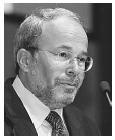ALBANIA
Fatos Thanas Nano
Prime Minister

(pronounced "FAH-toess TAHN-ahs NAH-no")
"We [Balkan nations] all have the same priorities, but real change can happen only if we build a regional authority to lead the way."
The Republic of Albania is situated in southeastern Europe and is bordered to the south by Greece, to the east by the Former Yugoslav Republic of Macedonia (FYROM), to the north by Serbia and Montenegro, and to the west by the Adriatic Sea. The total area is 28,748 sq km (17,864 sq mi), of which over two-thirds is mountainous and the rest river valleys and coastal lowlands.
The country's total population was estimated at 3.5 million in July 2002. Over 95% are ethnic Albanian, with Greeks comprising most of the rest. Outside of the country's borders live about an equal number of ethnic Albanians, mainly in the Kosovo region within Serbia and Montenegro, and also in Macedonia, Greece, and Italy. About 70% of the population are Muslim; however, atheism is also widespread as a result of an official ban on religious worship from the 1960s to 1990. By 2002 the government had relaxed this ban, and the practice of religion increased slightly. The Albanian language has two main dialects, Geg and Tosk (considered the official dialect).
The country's gross domestic product (GDP) was estimated at US $13.2 billion in 2001, with per capita GDP estimated at US $3,800 that year. The national currency is the lek . Albania's natural resources include oil, gas, coal, and metals. Agriculture and mining constitute the largest industries. Frequent drought, obsolete equipment, and the need to consolidate numerous small farms have hampered the growth of the agriculture sector.
ADDRESS
Office of the Prime Minister
Tirana, Albania
Comment about this article, ask questions, or add new information about this topic: